What part of 'no religious test' don’t we understand?

The Constitution says there can be no religious test applied to those seeking office at the federal level (Article 6, clause 3). But lately some on the left are trying to apply a type of religious test against some would-be Trump nominees.
Two years ago, Vermont Senator Bernie Sanders raked a Trump nominee over the coals because of the man’s theological views. Russell Vought, a nominee to the Office of Management and Budget, attended Wheaton College. In an article on changes at Wheaton, Vought had mentioned that he believed Jesus was the only way to God. (This is based on something Jesus Himself said in John 14:6.)
Despite the Constitutional ban on a religious test, Sanders applied such a test and found Vought wanting. Look at their interaction from the hearing:
Vought: “Senator, I’m a Christian---”
Sanders: “I understand you are a Christian. But this country is made up of people who---I understand, that Christianity is the majority religion. But there are other people of other religions in this country and around the world. In your judgment do you think people who are not Christians are going to be condemned?”
Vought: “I wrote a post based on being a Christian in attending a Christian school that has a statement of faith that speaks clearly with regard to the centrality of Jesus Christ in salvation.”
Sanders: “I would simply say, Mr. Chairman, that this nominee is really not someone who is what this country is supposed to be about.”
Today, Sanders is again a serious contender for the presidency. Yet he flagrantly disregards this aspect of the Constitution. Unfortunately, he’s not alone.
On September 7, 2017, California Senator Diane Feinstein sat in judgment on Catholic appeals court nominee Amy Coney Barrett. Feinstein intoned, “I think whatever a religion is, it has its own dogma. The law is totally different. And I think in your case, professor, when you read your speeches, the conclusion one draws is that the dogma lives loudly within you, and that’s of concern.”
Wow. “The dogma lives loudly within you.” There is a sense in which a secularist is somehow held in greater esteem than the believer---at least in Feinstein’s world. As if Madalyn Murray O’Hare was a greater American than George Washington?
More recently, in December 2018, California Senator Kamala Harris and Hawaii Senator Mazie Hirono raked over the coals a would-be federal judge, Brian Buescher, for being a member of the Knights of Columbus, the world’s largest charitable Catholic group (with nearly two million members). They asked him if he would renounce his membership in such an “extreme organization.”
Senator Hirono noted to Buescher, “The Knights of Columbus has taken a number of extreme positions. For example, it was reportedly one of the top contributors to California’s Proposition 8 campaign to ban same-sex marriage.”
Senator Ben Sasse of Nebraska thought that this anti-Catholic bias was so wrong that he forced a vote to rebuke such actions. Sasse told Fox News, “Happily, big win tonight,” as the Senate voted unanimously for his resolution. That would mean even Harris and Hirono voted for it in a remarkable show of inconsistency.
When I read comments like those of Sanders or Feinstein or Harris or Hirono or Cory Booker, I think of what Dr. Richard Land once told me in a television interview.
Land, the president of Southern Evangelical Seminary, told our viewers, “Religious freedom is at risk in America. It’s under assault by political correctness and by the secular fascists of our time who want to try to impose their own code of conduct on everyone. The only thing that moral relativists cannot countenance is this: people who believe in moral absolutes. So they will seek to ostracize, and they will seek to penalize, and they will seek to prosecute people who do believe in absolute truth---mainly Christians.”
The irony of all this is the major role the Bible helped play in the founding of America. Vishal Mangalwadi, an Indian scholar, wrote The Book That Made Our World, on how the Bible helped shape not only America but the West.
Mangalwadi told me in an interview: “The Bible’s influence in America has been the factor that made America a great nation. So, whether you look at freedom: political, economic, family, education, science, technology; the Bible’s influence has been pervasive for America and that’s the reason why a new president, when he takes his oath of office to uphold the Constitution, puts his hand on the Bible. In the Court, when you took an oath that you will speak the truth, you put your hand on the Bible.”
But if the secularists ultimately win, then only secularists need apply to jobs in the public square. What part of “no religious test” don’t they understand?





















